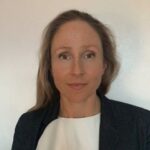2020 was a year of virtual meetings. We travelled less, met more, said “you’re still on mute” frequently and learnt new terms like ‘Teams fatigue’. Covid-19 was here, humanity feared for its future and single use medical equipment was ordered, used/not used, and incinerated. There was genuine fear from patients and healthcare staff; deaths occurred in both groups. We met new people as continents and time-zones were no longer a barrier; we could see people’s faces online, we learnt to trust from a distance, made professional connections, friendships and felt a bit closer: “in it together”.
Covid-19 was bad, but it also felt like a ‘warning shot’ revealing the vulnerability of healthcare systems. Whilst most healthcare professionals necessarily focussed on the immediate threat, others were looking elsewhere, drawing parallels between the pandemic and sustainability. Delivering a ‘Net Zero’ National Health Service was published October 2020, a landmark moment for those providing human healthcare; the gauntlet laid, we had a goal.
There was however something niggling away in the back of my mind; something missing which I felt, if not included, would be catastrophic for people and planet. What was missing was: The Ocean.
The Ocean covers 71% of earth’s surface, provides 99% of living space, absorbs 90% of the planet’s excess heat, 25% of our CO2 and produces 50% of the oxygen we breathe. As an amateur ocean enthusiast, I knew the planet and its inhabitants couldn’t survive without healthy oceans; and the seas, coasts and global Ocean are, like land and atmosphere, being challenged by all industries (including healthcare) through waste, pollution, and inattention to nature.
Through carbon sequestration, billions of tonnes of photosynthesising ocean phytoplankton are “our greatest ally in combatting climate change” (David Attenborough, A Perfect Planet). We are however a species that lives and breathes on land; often failing to make the connection between our daily lives and the ocean. The ocean not only starts with every river, but also with every sink, toilet, and drain. Human health is inextricably linked to the oceans and waterways and the use of aquatic environments as a waste sink is associated with numerous adverse health impacts which must not be ignored by healthcare systems and policymakers.
Before we’d met, Dr Georgie Sowman and I were independently raising concerns in meetings; ‘what about the ocean….’ we’d say. “What about the ocean?” would be the reply and it was difficult to get the time needed to explain. This was however the opportunity; the NHS was leading the global healthcare-sustainability agenda and it was the UN Decade of Ocean Science for Sustainable Development. The ocean needed to be heard.
A Northeast Integrated Care System sustainability meeting changed everything when I mentioned the word “ocean”. Georgie immediately commented, we met (virtually), and Healthcare Ocean was born. We first agreed our Aim was to: “conserve and protect coastal and marine ecosystems through minimising harm resulting from the procurement and delivery of healthcare, whilst increasing awareness of the benefits to human health and wellbeing from healthy seas, coasts, and waterways.”
We had no idea how to develop an organisation, but struck lucky when introduced to Professor Lora Fleming, Founder of the European Centre for Environment and Human Health and Chair of Oceans, Epidemiology and Human Health at the University of Exeter. Lora’s opening words were “where have you been for the last 2 decades”; and she became both catalyst and cheerleader with connections to help us progress. Friends designed our brand; we registered a trademark to give us identity; created a website; and reached out to NHS leaders, so they knew of our existence and intentions.
We spoke at every event and on every podcast we could, the size didn’t matter! We just needed to ‘talk oceans and waterways’. We spoke of risk, urgency, what was at stake, and how the oceans were not a bottomless resource. We communicate ‘oceans AND us’, not ‘for us’; and the invitations to speak increased (including the COP26 and our own Conference).
We remained a small, agile, inclusive team believing ‘we all cross the line together or none of us cross it at all’. We focussed on communication, advocacy, and the development of actions deliverable by individuals, healthcare organisations and connected industries. Breaking down barriers and engaging with stakeholders was critical; finding the language and touch points, whether this was people, planet, or the financial bottom line.
Open communication and networking resulted in working with inspirational like-minded people who understand how healthcare has a unique ability to drive change. We thought ‘beyond carbon’ (one pollutant of many), developing actions (published on https://www.healthcareocean.org), and explaining to everyone why we are doing what we are doing to amplify our voices and inspire others. We have learnt we must place nature at the centre of our strategies: to understand our footprint, help it recover from decades of mistreatment and re-examine our connection, ensuring initiatives benefit both humans and natural environments.
Georgie and I had worked as front-line healthcare providers throughout Covid-19 and knew what was at risk. We became non-partisan communicators linking academia, policy makers, healthcare, and commercial suppliers; and when tasks were beyond our skills or resource, we passed our knowledge and guidance, enabling others to drive change. We did not wish to build an empire, but to help those who also believed all healthy natural systems were essential to secure a future for all. Forming Healthcare Ocean was the right thing to do; and when we collaborated, we found healthcare’s voice to be powerful.
We believe (our ‘why’) healthy natural systems including oceans offer the planet and its inhabitants the best chance of surviving the climate and nature emergency. Our high-level work streams are global procurement/container shipping, macro waste/plastics, chemical contamination, and nature footprint/recovery/connection. We lead in some of these areas, collaborate in others, but we are always there to ensure the oceans and nature have a voice and are never forgotten.
Authors

Richard Hixson
Dr Richard Hixson is a Consultant in Critical Care Medicine, Physician Environmentalist, and co-founder Healthcare Ocean. Honorary Senior Clinical Lecturer, University of Exeter; member of the UK Ocean Decade Committee and NHS England’s Sustainable Procurement Forum.

Georgie Sowman
Dr Georgie Sowman, GP in Northeast England, Office of Health Improvement and Disparities Physical Activity Clinical Champion Northeast England. Co-founder Healthcare Ocean
Twitter handle:
@oceansandus
Declaration of interests
We have read and understood the BMJ Group policy on declaration of interests and declare the following interests: None